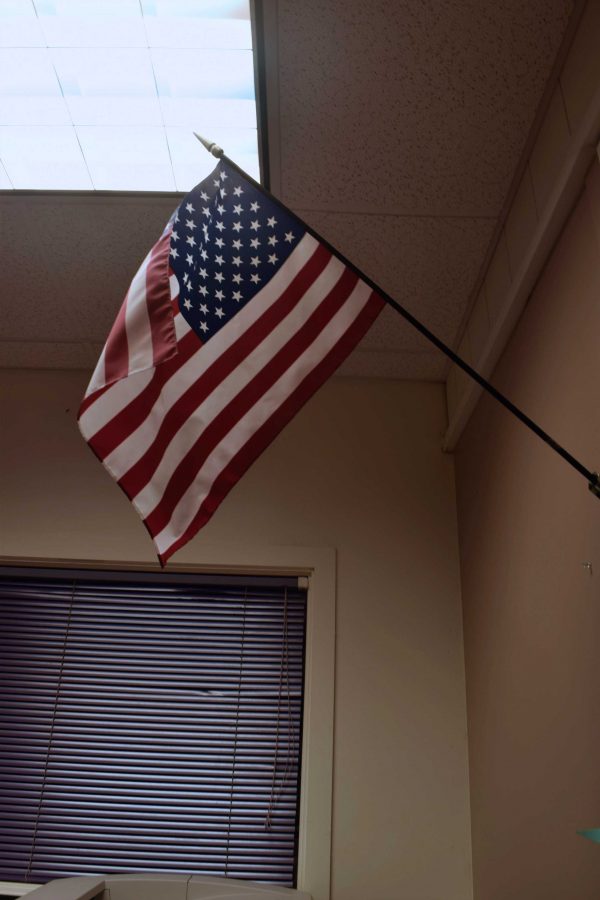The standstill in the beginning of 5th period is nothing new. As the daily announcements project overhead in every classroom on the Monta Vista campus, students and teachers both listen. Announcements vary from day to day — sometimes, they’re about the upcoming football game, other times they’re about the newly created clubs on campus.
The historical thought of the day, however, is something that remains constant in MVHS’ schedule. The historical thought revolves around iconic historic events which occurred on each day, several years — or even centuries — prior.
Section 52720 of Calif.education code (CAEC) states: “In every public secondary school there shall be conducted daily appropriate patriotic exercises.” The most obvious and commonly used of these patriotic exercises is the Pledge of Allegiance. Other exercises include playing the National Anthem or, as used by MVHS, the historical thought of the day.
Ever since 49er’s Quarterback Colin Kaepernick sparked up conversation regarding whether the action to stand up during the Pledge of Allegiance is justified, the public has been quick to take sides.

Such patriotism enforced on a football field is one thing, but in the classroom? While many have opinions on whether this school-enforced patriotism is something to keep or change, there’s a population which has encountered it for longer than any student will: teachers.
Teachers don’t always make the rules, but they do have to enforce them. But do they always agree with what they’re enforcing? Biology teacher Pooya Hajjarian states they don’t always,“It’s sort of like a preference on how important it is to you, but do I think it should be forced on everybody? No.”
Hajjarian and many other teachers acknowledge school isn’t a place for enforcing patriotism. On the flip side, one can view the patriotic acts as harmless and beneficial.
Hajjarian follows up explaining that saying the pledge is his form of saying ‘thanks’ and paying respects to the opportunities available since he moved here from Iran as a little boy. “This country has provided something for me that I don’t think my family would have had if we haven’t moved here.” He said.
History and Government teacher Hilary Barron agrees.
“When we sing this national anthem or listen to this national anthem,” She said. “I guess it’s part of our tradition that we respect this song and symbol of the unity of our country.”
CAEC also states, “Providing instruction that promotes understanding the concepts of “pledge,” “allegiance,” “republic,” and “indivisible,” and understanding the importance of the pledge as an expression of patriotism, love of country, and pride in the United States of America shall satisfy the requirement of Section 52720.”

Many disagree; many agree. Having passionate views on both ends of the spectrum is something the public holds, but it hasn’t always been this way. Hajjarian says he didn’t necessarily consider the pledge as noteworthy until the recent dispute has blown up.
“As far as saying [the pledge], I agree that I think a lot of times we say it just to say it.” he said.
Although the CAEC doesn’t specify whether it is acceptable for students to willingly forgo these patriotic activities, many students continue to do so. Student teacher Ken Gan explains his experiences with students sitting during the Pledge of Allegiance at Wilcox High School.
“I had multiple teachers who would always allow the opportunity for students to sit, they did not have to stand.” he said. “Most of the time we would encourage students to stand even though they did not support.”
Many students and teachers alike believe that the enforced pledge is either unnecessary or inappropriate at schools. Students are now taking action — many sitting or kneeling during these patriotic activities. And although it wasn’t a topic of dispute, when teachers were students, they seem to have had their freedoms to sit as well.
Ever since the discussion blew up this year, thanks to both Kaepernick and public views shifting, teachers have taken a stance in choosing which side they find most just. Several are strong believers of keeping the tradition of standing during the pledge, and several are acknowledging it’s one’s right to accept or oppose.
But for now, the beginning of 5th period will remain a time to stay quiet and listen to the patriotic announcement overhead — whether you like it or not.










